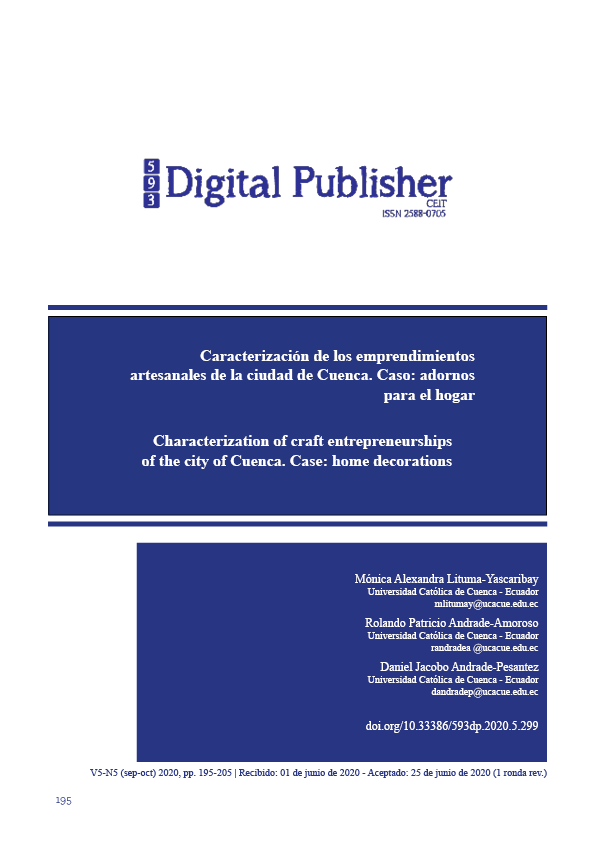Caracterización de los emprendimientos artesanales de la ciudad de Cuenca. Caso: adornos para el hogar
Contenido principal del artículo
Resumen
En el Ecuador el sector artesanal es uno de los que más aporta dinamismo a la economía del país, generando empleo y crecimiento económico a nivel local y nacional. Entre los organismos que apoyan este sector se puede mencionar la Junta Nacional de Defensa del Artesano que es un organismo autónomo para apoyo y control a los artesanos cuya misión es fortalecer las actividades de estos. El sector artesanal de la ciudad de Cuenca provincia del Azuay ha tenido un crecimiento significativo en los últimos años, los artesanos han manejado de manera empírica el desarrollo de sus actividades por la falta de aplicación de un modelo de gestión efectivo, este sector se ha visto afectado en su rentabilidad, en las operaciones financieras y control de los recursos. El objetivo del presente trabajo es determinar las características más relevantes bajo las cuáles se desarrolla el sector artesanal del Ecuador específicamente en la ciudad de Cuenca, enfocados sobre todo a la producción de adornos para el hogar. La metodología tuvo un enfoque cualitativo con un alcance descriptivo, el tipo de investigación fue no experimental porque la información obtenida de la revisión bibliográfica se la utilizó sin manipulación por parte de los investigadores. Entre los principales resultados se puede mencionar los siguientes: la mayor parte de este sector presenta un registro formal, invierte su capital propio para la producción, tienen gran capacidad instalada que en épocas bajas la subutilización disminuye su rentabilidad pues el margen de utilidad oscila entre el 0% al 5% lo que trae como consecuencia reducción del número de emprendimientos artesanales reducción de contratos a artesanos aprendices. Es importante mencionar que este sector tiene varios beneficios de tipo tributario y laboral, así como también existen instituciones financieras que otorgan créditos de acuerdo a las necesidades de los artesanos. Como conclusión sería muy importante que los artesanos se capaciten en herramientas de gestión contable-financiera para mejorar sus competencias e incrementar su rentabilidad.
Descargas
Detalles del artículo
1. Derechos de autor
Las obras que se publican en 593 Digital Publisher CEIT están sujetas a los siguientes términos:
1.1. 593 Digital Publisher CEIT, conserva los derechos patrimoniales (copyright) de las obras publicadas, favorece y permite la reutilización de las mismas bajo la licencia Licencia Creative Commons 4.0 de Reconocimiento-NoComercial-CompartirIgual 4.0, por lo cual se pueden copiar, usar, difundir, transmitir y exponer públicamente, siempre que:
1.1.a. Se cite la autoría y fuente original de su publicación (revista, editorial, URL).
1.1.b. No se usen para fines comerciales u onerosos.
1.1.c. Se mencione la existencia y especificaciones de esta licencia de uso.
Citas
Asamblea Constituyente. (2008). Constitución de la República del Ecuador. [Registro Oficial 449 del 20 oct 2008].
Aviles , H., & Durán, R. (2014). Universidad Politecnica Salesiana. Obtenido de https://dspace.ups.edu.ec/bitstream/123456789/6417/1/UPS-CT002969.pdf
BanEcuador. (12 de Abril de 2020). BanEcuador. Obtenido de https://www.banecuador.fin.ec/: https://www.banecuador.fin.ec/a-quienes-financia-banecuador/
Baque Pisco, V. (2015). Las artesanías ecuatorianas como patrimonio cultural; su aporte al desarrollo del turismo de la ciudad de Quito. Quito: Universidad Central del Ecuador.
Camacho Villegas, N. E. (2014). Responsabilidad social empresarial, RSE en las Pymes: estudio en el Distrito Metropolitano de Quito. Quito: Universidad Andina Simón Bolivar, Maestría en Dirección de Empresas.
Congreso Nacional. (1971). Ley de Defensa del Artesano. [Registro Oficial 71 del 23 may 1971].
Congreso Nacional. (1986). Ley de Fomento Artesanal. [ Registro Oficial No. 446 , 29 de Mayo 1986].
Congreso Nacional. (2005). Códico del Trabajo. [Suplemento del Registro Oficial No. 16 del, 16 de Diciembre 2005].
Contraloría General del Estado. (2011). Guía Metodológica para Auditorías de Gestión. Obtenido de http://www.contraloria.gob.ec/documentos/normatividad/Acuerdo047-CG-2011GUIAMETODOLIGICAPARAAUDITORIADEGESTION.pdF
Delgado, D., & Chávez, G. (2018). Las pymes en el Ecuador y sus fuentes de financiamiento. Guayaquil: Servicios Académicos Intercontinentales. Obtenido de Servicios Académicos interncontinentales.
Duque, D. (1996). Las artesanías, Un camino hacia la paz. Desarrollo de Base - Fundación interamericana, Arlington, 44-47.
Fabara, C. (26 de 08 de 2018). Beneficios legales de los artesanos. Obtenido de https://www.derechoecuador.com/beneficios-legales-para-los-artesanos: https://www.derechoecuador.com/beneficios-legales-para-los-artesanos
Ferro, D. (2015). Identidad, cultura e innovación en las artesanías: un camino para el desarrollo sustentable y el Buen Vivir. Revista internacional de administración Estudios de la Gestión, 96-116.
Flores Vite, E. D. (2015). UTEQ. Obtenido de http://repositorio.uteq.edu.ec/handle/43000/2428
Hoyos Zavala, A., & Rendón Alin, A. (2015). Aceptación de una empresa dedicada a la producción y comercialización de artículos artesanales en la ciudad de Guayaquil. Observatorio de la Economía Latinoamericana, 23.
Instituto Latinoamericano de Investigaciones Sociales. (1985). Foro Políticas de Fomento Artesanal en el Ecuador. Obtenido de https://biblio.flacsoandes.edu.ec/libros/digital/56196.pdf
Ministerio de Industrias y Productividad. (2010). Artesanía Patrionial. Obtenido de https://biblio.flacsoandes.edu.ec/libros/135250-opac
Precidencia de la República. (2011). Reglamento de Inversiones del Código Orgánico de la Producción, Comercio e Inversiones. [Registro Oficial S. 450 del 17 may 2011].
Presidencia de la República. (2010). Reglamento para la aplicación de la Ley Orgánica de Régimen Tributario Interno. [Registro Oficial S. 209 del 08 jun 2010].
Rhyne, E., & Otero, M. (1998). Servicios financieros para microempresas: Principios e instituciones. El mundo nuevo de las finanzas empresariales, Plaza y Valdés Editores, 43-60.
Tobar, P. (2012). Análisis del Régimen Impositivo Simplificado Ecuatoriano (RISE) y su impacto desde su implementación en el Sistema Tributario Ecuatoriano. Quito: Universidad Politécnica Salesiana.
Vega , C., & De Jesús, A. (2004). Diagnóstico sobre el potencial de la artesanía como actividad económica productiva para desarrollar con mujeres desplazadas y/o jefes de hogar y artesanos. Artesanias de Colombia, 1-30.




